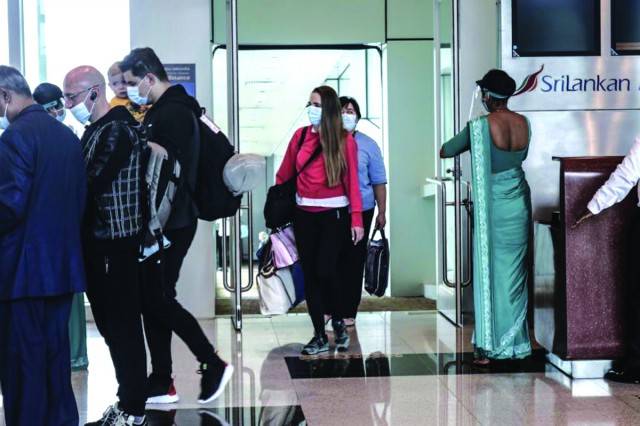
COVID-19 has caused insurmountable upheaval in life as we know it. How we travel, how we interact, if we interact at all; everything has come to a standstill, and the one thing we have to be grateful for, now more than ever, is the advent of technology which is keeping us all connected at a time when social distancing seems to be the only mode of survival.
In an era where travel used to be taken for granted, lockdowns have become the norm. Where handshakes were the global currency for a greeting, masks have replaced even an introductory smile; we are re-learning how to behave and access to each other, especially across oceans, has not been the exception to this overhaul in lifestyle.
A grim story unfolded in Sri Lanka last year, when the government shut down the national airports for incoming international passengers on March 19, 2020, leaving thousands of Sri Lankan nationals and residents stranded outside the country for months. The island-nation was not alone in this endeavor; the world saw unprecedented scenes of updated travel regulations spreading far and wide, and people who once lived in a world where catching a flight was just as common-place as eating and sleeping, now suddenly saw themselves separated by borders and bans. It took months to repatriate migrant workers; some still remain stranded in foreign lands. The most obvious reason for this is the most glaring one: financial constraints.
Governments around the world, Sri Lanka included, could not afford to keep bringing back citizens to the country free-of charge, simply because an already crumbling economy would not allow it. Due to the dangers of newer and more contagious variants of this deadly virus appearing globally, many countries around the world also started to implement mandatory quarantine requirements, thereby exacerbating what this meant in terms of cost. But not all government-imposed quarantines are currently equal, with varying surveillance levels, out-of-pocket costs and stay lengths that range from three days to three weeks. This culture of quarantine therefore not only shattered the economic gains of tourism in destinations around the world, but also acted as a barrier for loved ones to see their families again, as people found themselves stranded in different corners of the world.

Travel has become a privilege now: you have to be rich enough to pay for quarantine. The Sri Lankan government began this process of quarantine by establishing government centers which were initially free-of charge; as passenger numbers increased once airports were opened to tourists eventually late last year, this shifted to using hotels which were vetted to meet the requirements needed to be adequately suited for quarantine purposes. As it currently stands, there is a mandatory 14-day hotel stay required for any tourist entering Sri Lanka, whether vaccinated or otherwise. The cost per night varies from 100 USD to 120 USD. Given that the dollar rate in Sri Lanka, at the time of writing this article, stands at Rs203, this would mean that, per night, a stay would cost between Rs20,000–Rs24,000 and for two weeks, we would be looking at a grand total of Rs280,000 – Rs336,000. Covid-19 has caused the world’s economy to take an unthinkably violent beating; given this global atmosphere of scarcity and uncertainty, these amounts are in no uncertain terms reasonable.
For Sri Lankans who were visiting their families last March from countries such as Australia, Canada and the UK, all nations where a sizable Sri Lankan community exists, their return tickets cost within the range of $2,000- $3,000 USD, with quarantine costing an additional $3,000 in most cases. For the average person, these are unthinkable numbers. In an atmosphere where anxiety is already at an all-time high, how does one expect to also shoulder the stress of not being able to return home or visit loved ones because savings need to be broken into to survive; that is, if there are any left after the year the world has had.
As a push to revive the economy, the story got a lot worse since last year. Sri Lankan travel agencies began to promote special ‘Quarantine Packages’ for tourists coming in through the “Indian Travel bubble” established earlier this year. This was the gravest mistake yet. As a result of travelers escaping the dire situation within India, they quarantined in Sri Lanka, even if it meant just a transit, thereby spreading the virus to the entire island, resulting in the current lockdown in the nation.
Was it worth the money to have infected the population at large? Or is the cost of quarantine something that has become so necessary for governments, that they are willing to overlook the greater cost to human life?
The catch-22 of trying to revive the economy while trying to save lives is never an enviable task to be assigned with. Yet governments around the world find themselves in that exact situation.
Sri Lankan citizens are still finding it difficult to return home due to increased cost of quarantine, yet tourism is being encouraged; what feels like a great injustice is not being remedied, and further solidifies the notion that Covid19 didn’t break the system, but instead exposed an already broken status quo. “Nothing lasts” is the law of existence, and this too shall pass. But will it make us keen to make our millions before the next catastrophe, or revamp the systems upon which the less wealthy members of society are made to suffer?
The writer is a lawyer, teacher and political commentator based in Colombo, Sri Lanka. She can be reached on Twitter @writergirl_11
In an era where travel used to be taken for granted, lockdowns have become the norm. Where handshakes were the global currency for a greeting, masks have replaced even an introductory smile; we are re-learning how to behave and access to each other, especially across oceans, has not been the exception to this overhaul in lifestyle.
A grim story unfolded in Sri Lanka last year, when the government shut down the national airports for incoming international passengers on March 19, 2020, leaving thousands of Sri Lankan nationals and residents stranded outside the country for months. The island-nation was not alone in this endeavor; the world saw unprecedented scenes of updated travel regulations spreading far and wide, and people who once lived in a world where catching a flight was just as common-place as eating and sleeping, now suddenly saw themselves separated by borders and bans. It took months to repatriate migrant workers; some still remain stranded in foreign lands. The most obvious reason for this is the most glaring one: financial constraints.
As a result of travelers escaping the dire situation within India, they quarantined in Sri Lanka, even if it meant just a transit, thereby spreading the virus to the entire island
Governments around the world, Sri Lanka included, could not afford to keep bringing back citizens to the country free-of charge, simply because an already crumbling economy would not allow it. Due to the dangers of newer and more contagious variants of this deadly virus appearing globally, many countries around the world also started to implement mandatory quarantine requirements, thereby exacerbating what this meant in terms of cost. But not all government-imposed quarantines are currently equal, with varying surveillance levels, out-of-pocket costs and stay lengths that range from three days to three weeks. This culture of quarantine therefore not only shattered the economic gains of tourism in destinations around the world, but also acted as a barrier for loved ones to see their families again, as people found themselves stranded in different corners of the world.

Travel has become a privilege now: you have to be rich enough to pay for quarantine. The Sri Lankan government began this process of quarantine by establishing government centers which were initially free-of charge; as passenger numbers increased once airports were opened to tourists eventually late last year, this shifted to using hotels which were vetted to meet the requirements needed to be adequately suited for quarantine purposes. As it currently stands, there is a mandatory 14-day hotel stay required for any tourist entering Sri Lanka, whether vaccinated or otherwise. The cost per night varies from 100 USD to 120 USD. Given that the dollar rate in Sri Lanka, at the time of writing this article, stands at Rs203, this would mean that, per night, a stay would cost between Rs20,000–Rs24,000 and for two weeks, we would be looking at a grand total of Rs280,000 – Rs336,000. Covid-19 has caused the world’s economy to take an unthinkably violent beating; given this global atmosphere of scarcity and uncertainty, these amounts are in no uncertain terms reasonable.
For Sri Lankans who were visiting their families last March from countries such as Australia, Canada and the UK, all nations where a sizable Sri Lankan community exists, their return tickets cost within the range of $2,000- $3,000 USD, with quarantine costing an additional $3,000 in most cases. For the average person, these are unthinkable numbers. In an atmosphere where anxiety is already at an all-time high, how does one expect to also shoulder the stress of not being able to return home or visit loved ones because savings need to be broken into to survive; that is, if there are any left after the year the world has had.
As a push to revive the economy, the story got a lot worse since last year. Sri Lankan travel agencies began to promote special ‘Quarantine Packages’ for tourists coming in through the “Indian Travel bubble” established earlier this year. This was the gravest mistake yet. As a result of travelers escaping the dire situation within India, they quarantined in Sri Lanka, even if it meant just a transit, thereby spreading the virus to the entire island, resulting in the current lockdown in the nation.
Was it worth the money to have infected the population at large? Or is the cost of quarantine something that has become so necessary for governments, that they are willing to overlook the greater cost to human life?
The catch-22 of trying to revive the economy while trying to save lives is never an enviable task to be assigned with. Yet governments around the world find themselves in that exact situation.
Sri Lankan citizens are still finding it difficult to return home due to increased cost of quarantine, yet tourism is being encouraged; what feels like a great injustice is not being remedied, and further solidifies the notion that Covid19 didn’t break the system, but instead exposed an already broken status quo. “Nothing lasts” is the law of existence, and this too shall pass. But will it make us keen to make our millions before the next catastrophe, or revamp the systems upon which the less wealthy members of society are made to suffer?
The writer is a lawyer, teacher and political commentator based in Colombo, Sri Lanka. She can be reached on Twitter @writergirl_11

